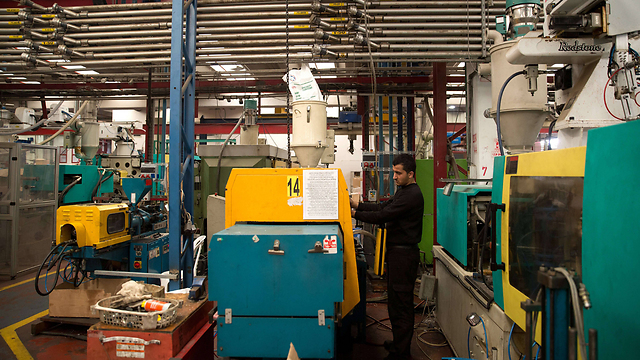At the start of the current decade, 35,000 Palestinians were working in Israel with permits. A further 20,000 were working without permits as "illegal aliens." They constituted less than one percent of the number of employees in the Israeli business sector, but the government was still disturbed by this phenomenon.
In January 2010, it therefore decided to create an interdepartmental team headed by Professor Zvi Eckstein, then the deputy governor of the Bank of Israel, "to formulate recommendations for the regulation, supervision and enforcement of employing Palestinians." The government's decision said that the team would include representatives from the Ministries of Defense, the Interior, Justice, Foreign Affairs, Finance, Public Security, Industry, and Agriculture, and the Borders Authority.
Miraculously, the team's broad composition did not delay the writing of the final report. Chairman Eckstein used his professional prestige to obtain everyone's consent to the joint recommendations, and in May 2011, the full report of the team (which had, by that point, become a committee) was delivered to the Israeli government.
The report spanned 30 pages, but the crux of it was this: Israel must — after decades of turning a blind eye, sputtering, uncertainty, mixing considerations and avoiding a clear opinion — determine an encompassing policy vis-à-vis Palestinian employment in Israel, implement it on the ground, and periodically examine its suitability in light of changing circumstances.
The correct policy, the report argued, must take into account Israel's security needs, the Israeli economy's needs, and also the needs of the Palestinian economy in the long term. Members of the committee agreed, according to Eckstein (today the head of the Aaron Institute for Economic Policy at the Interdisciplinary Center in Herzliya), that it was desirable to set a goal for the gradual reduction of Palestinian employment in Israel — not because of security restrictions, but rather in order to weaken the unhealthy embrace of a strong, rich economy with a weak, poor one.
"Providing employment opportunities for Palestinians in Israel," said Eckstein, "does indeed significantly improve the Palestinian standard of living, and therefore takes the edge off the occupation and eliminates the motives for terrorist attacks. This can be seen in statistical data: There are practically no attackers from families that make their living in Israel. But this is only a short-term sedative."
This, in his opinion, is an arrangement that "fortifies Palestinian dependency on Israel. The ability to work in Israel comes at the expense of local Palestinian development, at the expense of investing in the Palestinian economy."
In the long term, the benefit to Israel is also a double-edged sword: Palestinian labor reduces the wages of less-educated Israeli workers and makes it less worthwhile to invest in mechanization and raise the productivity of labor-intensive manufacturing industries such as residential construction.
The Eckstein Committee recommended, among other things, fully registering Palestinians at their entry and exit from work in Israel, formulating a bill of rights and duties and distributing it to the workers and employers, transferring the Palestinian employees' salaries directly into their bank accounts in the Palestinian Authority, requiring Israeli employers to provide transit from the checkpoint to the workplace and back, centralizing the matter under one government authority (instead of across the five authorities that are supposed to handle it now), and establishing a professional, permanent team to examine Israeli employers' work-permit applications for Palestinians.
What happened to the recommendations? I asked Eckstein this weekend. The report and its recommendations, he answered, "were buried immediately. Nothing was implemented." In fact, you can see that what happened is exactly the opposite of the recommendations. The number of Palestinian workers legally employed in Israel has doubled since and is approaching 65,000-75,000. Another 35,000 work in Israel without permits. Most Palestinians are employed in construction, where their proportion has risen to 16 percent, compared to 10 percent five years ago. Their proportion in agriculture is reaching 12.5 percent. Needless to say, all governments since 2011 have not decided on any all-encompassing policy for employing Palestinians in Israel.
Last year, Palestinian workers brought home approximately $1.7 billion — about $1,000 per month. The average salaries under the Palestinian Authority are lower than NIS 2,000 ($515) per month. It's therefore not surprising that those with skills, abilities and initiative are looking for every possible way to work in Israel. Those lacking in skills and luck remain on the other side of the fence, their situation is deteriorating, and despair is on the rise.
Until a knife is drawn.




















